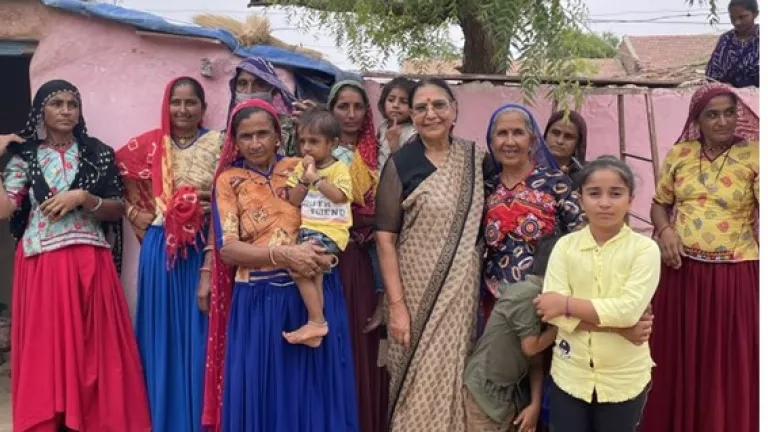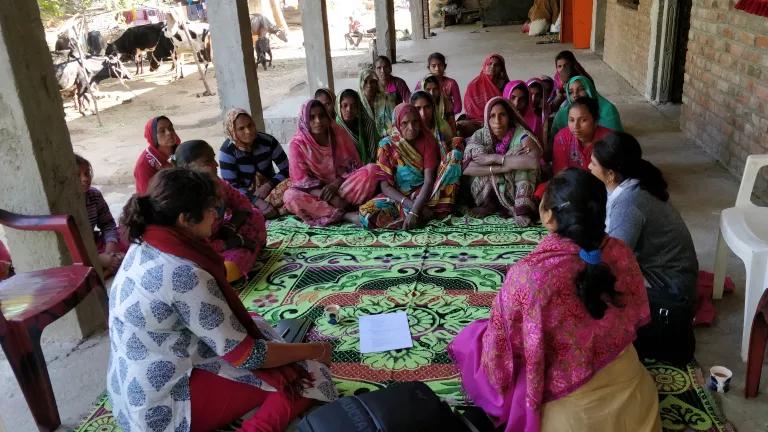Implementing Women-Led Clean Energy Solutions in India
This week, Ministry of New and Renewable Energy (MNRE), Association of Renewable Energy Agencies of States (AREAS), NRDC, and Self Employed Women’s Association (SEWA), organized a workshop on Policy and Intervention for Women in Renewable Energy. The aim was to bring together key union ministries, state nodal agencies, technology suppliers, entrepreneurs, and beneficiaries for dialogue and deliberations to find pathways to empower women through renewable energy.

Beneficiaries from Gujarat, Telangana, Karnataka, Rajasthan and Jharkhand talk about the impact of renewable energy and climate friendly solutions on their lives at the “Workshop on Policy and Intervention for Women in Renewable Energy”
Guest blog by Akanksha Golchha
Women are inequitably affected by climate change due to a long-entrenched history of roles, social structures, and access to resources. However, access to renewable energy, especially at the village-level, can make a difference. In addition to cutting down carbon emissions, and enhancing energy security, renewable energy solutions led by and targeted at women can accelerate economic and social empowerment. India's Ministry of New and Renewable Energy (MNRE), Association of Renewable Energy Agencies of States (AREAS), NRDC, and Self Employed Women’s Association (SEWA), recently organized a workshop on Policy and Intervention for Women in Renewable Energy to bring together key union ministries, state nodal agencies, technology suppliers, entrepreneurs, and beneficiaries for dialogue and deliberations to find pathways to empower women through renewable energy.
India’s Nationally Determined Contributions under the Paris Climate Agreement include transitioning to predominantly fossil-fuel-free sources of electricity generation. Distributed Renewable Energy (DRE) solutions, in addition to large-scale renewable energy, can contribute significantly to meeting India’s climate commitments. Unlike large-scale power generation, DRE requires smaller investment, has quicker turnaround time, and is more efficient as the electricity is generated close to the point of consumption.
Increased access to clean energy provides an opportunity to introduce livelihood and income generation options to users. Additionally, mechanization of activities and use of technology reduces drudgery and has health benefits, especially for women who are traditionally engaged in the roles of cooking, agriculture, animal husbandry related activities. The workshop focused on stakeholder discussions around MNRE’s “Women in Renewable Energy” initiative as well as the Hariyali Gram initiative. Hariyali Gram is a women-led initiative, currently implemented in 15 villages and supported by Association of Renewable Energy Agencies of States (AREAS), NRDC, and SEWA, focusing on scaling up clean energy solutions through comprehensive policy and market solutions to reduce energy poverty and improve livelihoods in rural India.
Experts Highlight Solutions
Shri Indu Shekhar Chaturvedi, Secretary, MNRE discussed the interconnected role of women in renewable energy, sustainable development, and interagency coordination. Talking about the Hariyali Gram initiative, he noted that DRE has immense possibilities and potential to enhance the lives of women and improve livelihood opportunities. He highlighted the need to identify convergence opportunities between various initiatives of allied ministries to scale up interventions. He mentioned that Hariyali Gram is an excellent example of how strategies have been translated into action on the ground.
Shri Chaturvedi later officially launched the “Women in RE” portal.

Dr. Vandana Kumar, Additional Secretary, MNRE, addressing the participants in the welcome address at the “Workshop on Policy and Intervention for Women in Renewable Energy”
Dr. Vandana Kumar, Additional Secretary, MNRE highlighted the role of women's empowerment in the development of families and communities. Talking about the critical interface of energy and households, she mentioned that women are at the fulcrum of various MNRE initiatives—either benefitting from RE or contributing to the RE space.
Ms. Dipa Bagai, Country Head, NRDC India introduced the Hariyali Gram initiative and discussed its impact on women and households in rural India. Hariyali Gram is currently implemented in 15 villages. Thus, a proof of concept is available to scale up and is a natural next step.

Ms. Bagai talked about convergence between various ministries to present “Hariyali Gram” as a national campaign to contribute to India’s goals of equity, energy independence, and economic development while combating climate change.
Ms. Mamta Verma, Joint Secretary, Ministry of Panchayati Raj, Ms. Mercy Epao, Joint Secretary, Ministry of Micro, Small & Medium Enterprises (MSME), and Mr. Gaya Prasad, Deputy Director General, Ministry of Rural Development deliberated on the role of various ministries to promote Hariyali Gram.
Ms. Epao talked about the role of MSMEs in empowering women and highlighted the initiatives that focus on mainstreaming the economic activities through training and skilling interventions to create stable livelihood opportunities. While talking about synergies, Ms. Mamta Verma presented the possibility of considering Gram Panchayats as the nodal point of rural development and leveraging existing self-help groups (SHG) to scale up adoption. Adding to the discussion, Mr. Gaya Prasad highlighted the potential to converge DRE with existing schemes and institutional mechanisms such as the Mahatma Gandhi National Rural Employment Guarantee Act (MGNREGA).
The workshop included discussion on initiatives by entities such as the United Nations Environment Programme, Council on Energy, Environment and Water, Selco Foundation, and Dharmalife focused on promotion of women in renewable energy. The initiatives span from enabling finance, enterprise development, capacity building, skilling, impact assessment, and on ground implementation.
Following this, a panel discussion on role of women entrepreneurs in adoption of renewable energy highlighted the need for creating supportive environment for women, ensuring safety and security. The panel highlighted the need for behavioral change campaigns for encouraging women's participation in the RE sector. The need to streamline financing options for women entrepreneurs in DRE sector covered issues such as asset ownership, collaterals, training and capacity building of bankers, and access to impact investments and green funds. On the role of industry, the development of affordable and women friendly technologies emerged as a key issue. At the grassroots level, sensitization of women regarding the impact of DRE along with ensuring access to finance and trainings emerged as the key asks.

Workshop Participants at the “Workshop on Policy and Intervention for Women in Renewable Energy”
Participants and policy makers agreed that the following elements are crucial for scaling up women's participation in RE:
- Formation of gender sensitive programs and policies,
- Access to finance and green funds,
- Skill development, training, certification and capacity building related to climate friendly technologies,
- Institutional strengthening at all levels, and,
- Inclusion of beneficiaries from the beginning were some of.
The discussion in the workshop focused on how policies can have convergence so as to provide necessary impetus to RE sector while focusing on women's empowerment. Identifying synergies between the programs of different ministries would help achieve the multiplier effect required to convert every village to a green village. Based on the workshop discussions, NRDC and partners will prepare a plan of action and continue to work with all stakeholders to support women as agents of transformation in India’s clean energy revolution.
Akanksha Golchha is the Clean Energy Access Lead (Consultant) with NRDC




